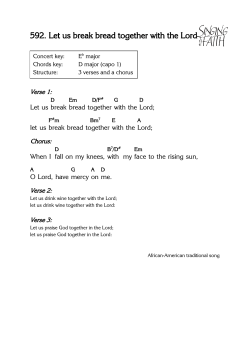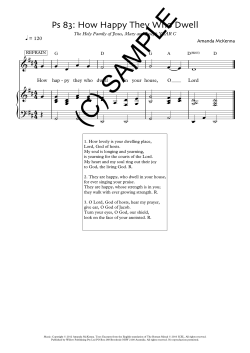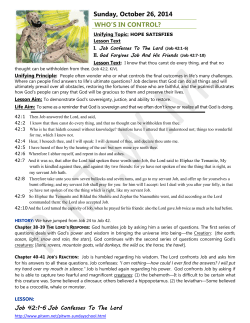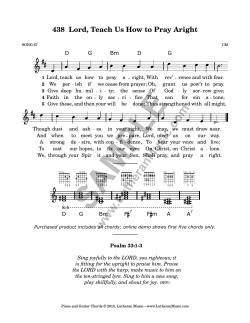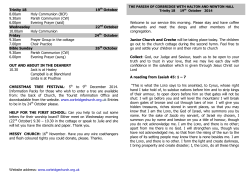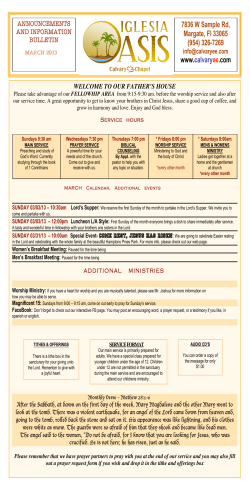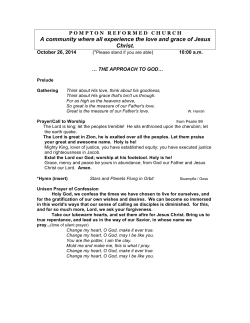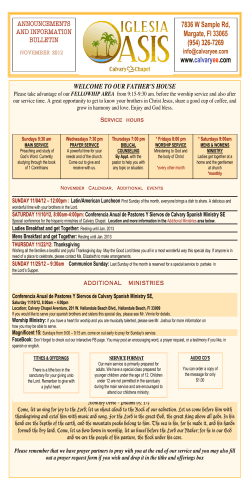
Hope Satisfies Aim for Change
26 October 2014 Hope Satisfies Bible Background • Job 42; Psalm 86 Printed Text • Job 42:1–10 Devotional Reading • Galatians 1:11–19 Aim for Change By the end of this lesson, we will: EXPLORE the conclusion of Job and God’s conversation; AFFIRM that God will answer our questions in ways best for us; and BECOME involved in an active and hopeful prayer life. In Focus Deborah remembered when she and her husband bought a home in 1980. This was the dream home that they had prayed for. They had saved enough for a down payment and knew that the time was right. They saw their children grow up there and planned to be there for life. This all changed after her husband experienced a stroke, and they refinanced their home. The mounting medical bills worried her husband, who did not want Deborah to be left to pay his medical expenses upon his untimely demise. After his death, she learned that the refinanced mortgage loan was not a fixed rate mortgage, but an adjustable rate mortgage. Soon Deborah’s mortgage payments went from $1000 a month to $1700 a month. Deborah, who lived on a fixed income, was in danger of losing her home. She sought the help of legal aid. They soon discovered that she had been a victim of a now bankrupt company’s tactic of offering subprime loans to minorities. Deborah didn’t know how it was going to turn out, but hoped in God’s goodness. Sometime later a mortgage assistance program reduced her mortgage and gave her financial assistance as well. In today’s lesson, we will look at how Job’s hope in the Lord was rewarded. Keep in Mind “And the LORD turned the captivity of Job, when he prayed for his friends: also the LORD gave Job twice as much as he had before” (Job 42:10). Focal Verses KJV Job 42:1 Then Job answered the LORD, and said, 2 I know that thou canst do every thing and that no thought can be withholden from thee. 3 Who is he that hidest counsel without knowledge? therefore have I uttered that I understood not; things too wonderful for me, which I knew not. 4 Hear, I beseech thee, and I will speak: I will demand of thee, and declare thou unto me. 5 I have heard of thee by the hearing of the ear: but now mine eye seeth thee. 6 Wherefore I abhor myself, and repent in dust and ashes. 7 And it was so, that after the LORD had spoken these words unto Job, the LORD said to Eliphaz the Temanite, My wrath is kindled against thee, and against thy two friends: for ye have not spoken of me the thing that is right, as my servant Job hath. 8 Therefore take unto you now seven bullocks and seven rams, and go to my servant Job, and offer up for yourselves a burnt offering; and my servant Job shall pray for you: for him will I accept: lest I deal with you after your folly, in that ye have not spoken of me the thing which is right, like my servant Job. 9 So Eliphaz the Temanite and Bildad the Shuhite and Zophar the Naamathite went, and did according as the LORD commanded them: the LORD also accepted Job. 10 And the LORD turned the captivity of Job, when he prayed for his friends: also the LORD gave Job twice as much as he had before. NLT Job 42:1 Then Job replied to the LORD: 2 “I know that you can do anything, and no one can stop you. 3 You asked, ‘Who is this that questions my wisdom with such ignorance?’ It is I— and I was talking about things I knew nothing about, things far too wonderful for me. 4 You said, ‘Listen and I will speak! I have some questions for you, and you must answer them.’ 5 I had only heard about you before, but now I have seen you with my own eyes. 6 I take back everything I said, and I sit in dust and ashes to show my repentance.” 7 After the LORD had finished speaking to Job, he said to Eliphaz the Temanite: “I am angry with you and your two friends, for you have not spoken accurately about me, as my servant Job has. 8 So take seven bulls and seven rams and go to my servant Job and offer a burnt offering for yourselves. My servant Job will pray for you, and I will accept his prayer on your behalf. I will not treat you as you deserve, for you have not spoken accurately about me, as my servant Job has.” 9 So Eliphaz the Temanite, Bildad the Shuhite, and Zophar the Naamathite did as the LORD commanded them, and the LORD accepted Job’s prayer. 10 When Job prayed for his friends, the LORD restored his fortunes. In fact, the LORD gave him twice as much as before! The People, Places, and Times Dust and Ashes. To sit or to lie in dust and ashes was often a sign of repentance and humiliation in the ancient Near East. Dust represented man’s frailty, and to lie in dust was to recognize the frailty of one’s humanity in committing a wrong or experiencing grief due to the loss of a loved one, famine, or other calamity. Ashes symbolized worthlessness; to throw ashes on one’s head was to humble oneself and acknowledge one’s worthlessness in the sight of God. These gestures were not mandated by God but originated in the culture of the time. Eliphaz, Bildad, and Zophar. Job’s friends mourned with him for seven days after he suffered great loss. They then encouraged Job to confess his sin of pride, as they believed that it was the reason for his suffering. Eliphaz appealed to personal experience, Bildad pointed to universal wisdom, and Zophar declared what he felt was common sense. They all agreed that Job’s problems were his own doing and that questioning God simply made matters worse. Background After Eliphaz, Bildad, and Zophar finished speaking to Job concerning his suffering, a young man named Elihu spoke. Elihu rebuked the three friends for being unable to give Job a reasonable answer for why he was suffering. However, Elihu was only able to give a partial answer to Job’s question by saying that people cannot understand all that God allows but must trust Him. This was the best answer that a human could give, yet it was incomplete because Elihu did not have all of the facts. Finally, the Lord spoke! Instead of answering Job’s question directly, God asked Job a series of questions that no human could possibly answer. God showed that He is eternal, holy, and incomprehensible! At-A-Glance 1. Job’s Response to the Lord (Job 42:1–6) 2. The Lord Responds to Job’s Friends (vv. 7–9) 3. The Lord Reverses Job’s Situation (v. 10) In Depth 1. Job’s Response to the Lord (Job 42:1–6) Job understands his humanity in a new way. He has an encounter with God that causes him to re-evaluate his perspective. Job repents of complaining, as he now knows that God is sovereign. His spiritual eyes have been opened, and he humbles himself in dust and ashes. Job is now conscious of the fact that he did not speak in the right way concerning God. His speech only served to hide God’s true purposes rather than reveal them. He sought to understand God and his ways but fell short. His repentance is an acknowledgment that God is in control and that He alone knows what is best for His creation. 2. The Lord Responds to Job’s Friends (vv. 7–9) The Lord is angry with Job’s friends. They are deserving of His wrath. He demands a sacrifice from Job’s friends as a payment for defaming the name of the Almighty. Seven bulls and seven rams, which represent a sin offering, must be taken to Job, who will pray for his friends. Only then will the Lord forgive Job’s friends and not treat them as their sins deserve. The Lord calls Job’s friends to account for their bad advice and counsel. They spoke for God when they too did not understand God. In fact, God says they did not speak about Him correctly. They accused Job and did not have the right to do so. As a result, their sins must be atoned for and they must rely on the prayers of the one whom they sought to accuse. 3. The Lord Reverses Job’s Situation (v. 10) Job prays for his friends, and the Lord accepts His prayer. Job is accepted because he has already repented of his arrogance and pride. God reverses Job’s situation and brings him out of “captivity.” It is also recorded that the Lord gives Job twice as much as he had before. This is all detailed in the rest of the chapter (vv. 11–17). All this happened as a result of Job’s prayer for his friends. Throughout the story of Job, we see him questioning God and His goodness. Now we see God giving Job even more than what he had before. The Lord knew the whole story while Job only knew a piece of it. Amid the wrestling, Job comes to have his spiritual eyes opened—not after he is blessed, but during the time of his trial. When Job first experienced his troubles, he had no idea that the Lord would restore him. When he began to pray for his friends, he had no idea that God was about to bless him with twice as much as he had before. Search the Scriptures 1. How was Job able to see God when God did not make a physical appearance (Job 42:5)? 2. Why was the Lord’s wrath kindled against Eliphaz, Bildad, and Zophar (v. 7)? Discuss the Meaning 1. In what ways do we speak for God without truly understanding Him? 2. How can we maintain our hope even when we do not see God’s purpose in our trials? Lesson in Our Society There are many people in our society who are experiencing the trials of life. Because of this, their hope grows thin and they resort to relieving the pain they feel through addictive and destructive behaviors. Even as believers, we often question God’s ways and whether He is good to us. This lesson shows us that the Lord can sustain us in our hope when we maintain intimate communication with Him. When our hope fades, He can strengthen us until His purpose is finally revealed. Make It Happen Evaluate the circumstances in your life and pray that the Lord would open your spiritual eyes to see what He is doing. But do not stop there! Pray that the Lord would show you how to respond to your family and friends who are going through circumstances that are beyond their control. Offer wisdom, prayer, and silence. We as humans cannot know what God is doing in someone’s life unless we seek God for our friend in need. Only speak when your friend is in danger or when the Lord shows you, then remain silent and let the Lord reveal an answer. Follow the Spirit What God wants me to do: Remember Your Thoughts Special insights I have learned: More Light on the Text Job 42:1–10 1 Then Job answered the LORD, and said, 2 I know that thou canst do every thing, and that no thought can be withholden from thee. 3 Who is he that hideth counsel without knowledge? therefore have I uttered that I understood not; things too wonderful for me, which I knew not. Now we come to the end of the book. When Job says “I know” (Heb. yada‘, yaw-DAH), he is acknowledging the omnipotence of God. God knows everything and He is all powerful. Job has had the amazing experience of God Himself speaking to him. God did not say the things that Job was hoping for or expecting. Instead of speaking about justice issues, God spoke of His mighty creation. Job and his friends had thought of God as the great moral accountant, chalking up our rights and wrongs, and dishing out appropriate punishments and rewards. In verse 3, Job quotes what God said earlier, intensifying the action with the verb “hideth” which is more complete than “darkeneth” (Heb. khashak, khah-SHAHK). There God said that Job was speaking out of ignorance when he brought his complaints before Him (38:2). “Hideth” in verse 3 is ‘alam, (Heb. ah-LAM), which is speaking of God’s grand designs for the universe that are concealed from us human beings. These are things that Job cannot speak of, because they are hidden from him and from us. God is the great I AM—He exists in the past, the present, and the future, all simultaneously. His plans take all of these things into account. What if we pray that it will not rain on our Sunday School picnic, while the farmer is praying for much-needed rain on his crops? How can God take all of these things into account? We don’t know—He just does. So what did Job say after hearing what God had to say about Himself? First of all, he discovered that God is much more than some superior human being. We miss by a long shot when we try to make God in our own image or imagine Him as the being who will meet our specific needs. When we pray, we often think we know just what God should do to answer our prayers, when in reality, God has the whole picture and we do not. 4 Hear, I beseech thee, and I will speak: I will demand of thee, and declare thou unto me. 5 I have heard of thee by the hearing of the ear: but now mine eye seeth thee. 6 Wherefore I abhor myself, and repent in dust and ashes. Job begins verse 4 by quoting God as He had spoken to him (38:3). God says that He wants to question Job, and Job must answer Him. This is a rhetorical question—one that Job answers in his mind, not aloud. But in verse 5, Job is ready with his answer, or non-answer in this case. When Job brought all his questions to God, he only asked from the point of view of a man who had a rather superficial knowledge of God—things that he had heard from others. But now that God Himself has talked with Job, Job’s view of God has greatly expanded. Now Job knows God’s voice, and he sees God with his very eyes and takes Him to heart. This is now a personal relationship with the God of the universe. His view of God is far bigger and yet more intimate. To see our holy God as He really is always causes us to realize how sinful we are in comparison. We think of Isaiah in the temple as God in His holiness appeared to him. Isaiah said, “Woe is me! for I am undone; because I am a man of unclean lips, and I dwell in the midst of a people of unclean lips: for mine eyes have seen the King, the LORD of hosts” (from Isaiah 6:5). We find Job saying a similar thing in verse 6. “I abhor myself” can have several different meanings. The verb in Hebrew is ma’as (mah-AHS) and can also mean to melt or submit. Job does not utterly hate himself. Although his three friends had accused him of doing terrible things, Job is not agreeing to their accusations. He still maintains that he has done nothing so awful that he deserves the troubles he has experienced. He is aware of his arrogance before the Lord. When coming face to face with God, all these things must have been going through Job’s mind. The last words that we hear from Job show his desire to “repent in dust and ashes.” The Hebrew word for “repent” is nakham (nah-KHAHM), in which we see him sighing, breathing strongly with a sense of sorrow, and regretting his ignorant and hasty words before God. 7 And it was so, that after the LORD had spoken these words unto Job, the LORD said to Eliphaz the Temanite, My wrath is kindled against thee, and against thy two friends: for ye have not spoken of me the thing that is right, as my servant Job hath. 8 Therefore take unto you now seven bullocks and seven rams, and go to my servant Job, and offer up for yourselves a burnt offering; and my servant Job shall pray for you: for him will I accept: lest I deal with you after your folly, in that ye have not spoken of me the thing which is right, like my servant Job. 9 So Eliphaz the Temanite and Bildad the Shuhite and Zophar the Naamathite went, and did according as the LORD commanded them: the LORD also accepted Job. Now we switch from poetry to prose as we come almost to the end of the book. God defends Job by speaking to his friends. Evidently Eliphaz was the oldest of the three men, and so he is chosen by God as the representative. The three friends have the very narrow view of God mentioned earlier—that God is the great moral police officer, a God of immediate retribution, quickly meting out punishment when people sin and quickly bestowing material riches on the righteous. Sometimes this is true, but often it is not. Some greedy people use all their wiles to pile up stuff for themselves. Other very good people generously give away much of their goods to help others. When we accuse people of wrongdoing, just because they are suffering, we are imputing to God a very limited character. We read in Hebrews 12:6 that the one “the Lord loveth he chasteneth, and scourgeth every son whom he receiveth.” Yes, those who suffer are more likely to be God’s favorite children. This is similar to the way good parents treat their children. They do not ignore them and let them do whatever they want. This is really not the loving way to parent. Good parents do not give their children everything they want. This would just make them lazy. And that is somewhat the way that God treats us. He allows hardship into our lives for a variety of reasons, but one is to strengthen us spiritually, to teach us to stay on our knees before Him. When we look at people who seem successful even though they are very immoral, we may be forgetting God’s grace and mercy to sinners as He waits for them to repent. Often people die without ever turning to God and then they are punished, because they have ignored the great grace of God. The book of Job should open our eyes to see more of the sovereign greatness of God. He alone does what He wants, because He alone sees the whole picture. The first chapter of Job let us as readers in on a conversation between God and Satan, so we could see why God allowed Job to suffer. But so far as we can see, God never shared this information with Job; Job had to trust God that He was working in the best interests of all those who love Him. Hopefully, this study has helped us to catch a greater vision of the greatness of our God. Job was certainly not perfect, but he passionately desired to communicate honestly with God. His friends, on the other hand, just mouthed platitudes that they had heard. But even worse, they arrogantly thought they knew why Job was suffering, even though they had no real evidence for sin on his part. So God commanded them to make a sacrifice of seven bulls and seven rams which probably signified complete atonement. Eliphaz, Bildad, and Zophar must have felt humiliated. They had thought they were the righteous ones, but God accuses them of sin and validates Job’s righteousness. To make things even worse, they need Job’s prayers of intercession for their own sakes. And the Lord accepts Job’s prayer for them. 10 And the LORD turned the captivity of Job, when he prayed for his friends: also the LORD gave Job twice as much as he had before. Here God has asked Job to take a step of faith. He first has to intercede for his so-called friends, and then the Lord gives him twice as much as he had before. Job had no idea that this would be the result, and he surely had to wait many years for this to happen. He lived 140 years more and in this time he had seven sons and three daughters, the same number as he had lost. Although children cannot be replaced with other children, nevertheless, these were amazing children. We look at the names of the daughters— Jemima, which means dove; Kezia, which means cinnamon; and Kerenhappuch, which means a container of expensive eye makeup. These are fitting names as they were the most beautiful women in all the land. Job lived to see his children grow up and have his grandchildren, and his grandchildren grow up and have his greatgrandchildren. His herds grew from nothing to double the number of sheep, camels, oxen, and donkeys than he had before. Not only did Job’s material blessings increase, but because of his experiences he gained the privilege of knowing God in a unique and powerful way. Say It Correctly Eliphaz. el-ee-FAHZ. Bildad. bill-DAD. Zophar. zoh-FAR. Jemima. dzeh-mee-MAH. Kezia. keh-zee-AH. Kerenhappuch. KEHR-ehn-HAP-ouk. Daily Bible Readings MONDAY I Wait for You, O Lord (Psalm 38:9–15) TUESDAY You Alone Are God (Psalm 86:1–10) WEDNESDAY Give Strength to Your Servant (Psalm 86:11–17) THURSDAY God Has Called You to Hope (Ephesians 1:11–19) FRIDAY My Hope is from God (Psalm 62:1–8) SATURDAY You Are the Hope of All (Psalm 65:1–5) SUNDAY Wonderful Things I Did Not Know (Job 42:1–10)
© Copyright 2026
